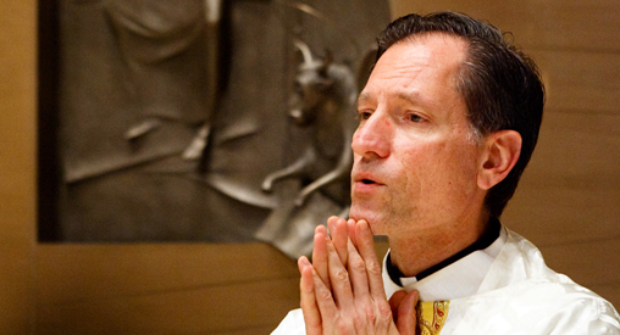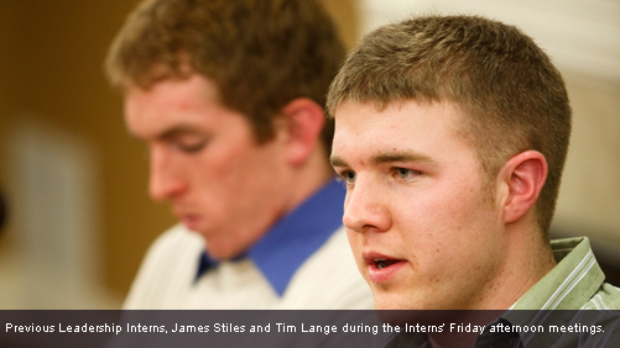Father Michael Keating received tenure and promotion to associate professor this spring.
Father Keating’s career has long been related to higher education, but his path to becoming a priest and professor at St. Thomas was a slow unfolding, not a rapid progression from undergraduate degree to M.Div. to Ph.D. He initially pursued bachelor’s and master’s degrees in the fields of history and English and a master’s degree in education at the University of Michigan in Ann Arbor. Then, for about a decade, he lived as a lay brother and served in campus ministry and youth work. After some time, he felt that he wasn’t where he belonged. “I wanted to be inside the classroom,” he says. He went on to the University of Notre Dame to pursue a Ph.D. in modern European Intellectual History. While he was in the process of getting his Ph.D., he began to think seriously about the priesthood, and by the time he had obtained his doctorate, he was ready for his next step: an M.Div. and M.A. in theology from the Angelicum in Rome. Since his ordination, he has been associated with Catholic Studies at St. Thomas – for three years as an adjunct professor and for the last six as a full-time faculty member.
His range of interests makes Catholic Studies a perfect fit for Father Keating. He has a particular interest in education and finds that the kinds of questions asked in a department like Catholic Studies are exactly the kind of questions he wishes to explore.
Keating is not merely a scholar; he is also very involved with the Catholic men’s and women’s houses and with the Leadership Intern program. He is the chaplain for the men’s and women’s houses, which have increased in number over the years. “First we had one men’s house, then a second, then a women’s house, and next year we will have two of each,” he says. These houses were planned as places where study and life would be integrated. “Students live together and fashion their lives around a Catholic ideal,” he explains. As chaplain, Father Keating assists with the students’ formation and gives talks, such as how residents can get along well with each other. He also oversees the housing application process.
Keating’s involvement with the Leadership Intern program is also extensive; he organizes the entire program, including managing the application process for the program, inviting speakers and working with students. The program began five years ago and is a chance for promising juniors and seniors to explore what it means to be a Christian leader. “The students have high ideals, but they feel ill-equipped,” he explains. The program helps these students develop good leadership skills and character as potential leaders. Each spring, students take 10 days to look at Catholic leadership. Recent visits have included Washington, D.C., to explore civic leadership, and Denver to see how Catholic Charities does its work there. A mix of students is involved in the program, including a few seminarians and women who are exploring a religious vocation, and many students interested in lay careers.
Related to this work, Keating is working on a new, yearlong volunteer program in Denver called Christ in the City. Students in the program will serve the needy, live in community and take a course related to their experience. He hopes that this program will attract students from across the nation.
In the midst of all this, Keating has completed scholarly publications, including an article on the virtue of magnamity in Logos and an article on education in the Newman Studies Review, and has provided extensive editing assistance on some recent books on Mother Teresa. He is submitting a book on the University of Oxford for publication, and he is working on a book on leadership with Dr. Michael Naughton. Father Keating’s work extends far beyond the classroom, but he is dedicated first and foremost to being a good teacher. “I prize teaching,” he says. He adds, “I am very grateful to be here, to be a part of Catholic Studies and the University of St. Thomas. This is an ideal place to work and teach.”
Read more from Perspectives







